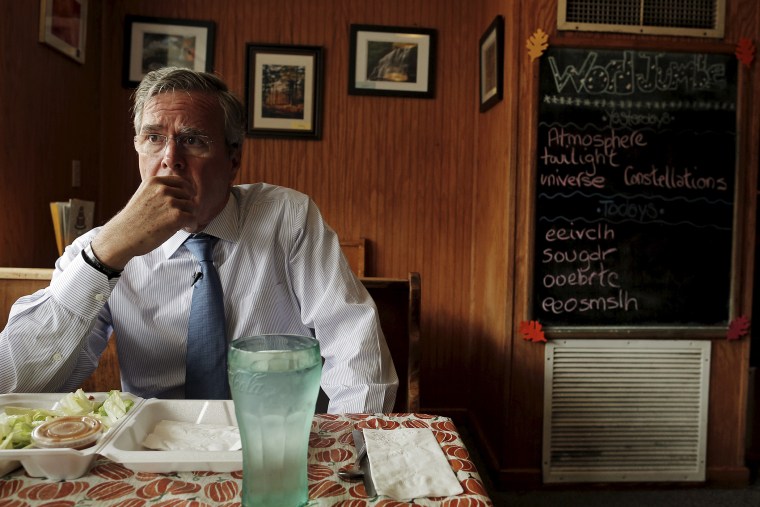Jeb Bush and his campaign operation recognized their strengths and weaknesses early on. The former governor wouldn't generate the largest crowds. He wouldn't deliver the most inspirational speeches. He wouldn't dazzle audiences with amusing quips in debates.
Bush would, however, dominate in the race for cash. Taking full of advantage of his fundraising prowess, establishment support, and family network, the Floridian intended to have more money than he knew what to do with.
Indeed, as 2015 got underway, the talk in Republican circles focused on "shock and awe" -- as in, Team Jeb would have an intimidating, overwhelming financial advantage that would not only position him as a top-tier contender, it might even keep rivals out of the race altogether.
Bush -- a former Florida governor who relied heavily on his family’s network to amass a $103 million war chest at his allied super PAC earlier this year -- announced Thursday that he collected contributions for his actual campaign at a drastically slower pace during a difficult summer. Bush raised $13.4 million from July to September, and started October with just $10.3 million on hand after spending about $11.5 million -- or 86 percent of the total over the quarter.
The closer one looks, the worse the numbers appear. For example, $13.4 million for the quarter isn't a disaster on its face, but it's roughly half what the leading Democratic contenders raised, and it's far less than the haul for a retired right-wing neurosurgeon who's never held elected office and who talks about Nazis a little often.
Complicating matters, as fall gets underway, Team Jeb has spent so much of its money that Bush now has less in the bank than Ben Carson, Ted Cruz, and Marco Rubio, just as the race enters a new, more competitive phase.
And making matters even worse still, Bush has very little to show for all the money he's already spent. The idea was, after Jeb's poll numbers started to drop, he'd start putting his money to use to bolster his support, but even after spending millions, Bush's standing
has not improved.
Despite a heavy onslaught of television ads in Iowa and New Hampshire by the pro-Bush super PAC, Right to Rise, his standing in public opinion surveys has remained relatively static or has even fallen. “The needle hasn’t moved an inch -- and he may be worse. That’s what’s scaring folks,” said a second top Bush fundraiser.
And as an objective matter, that fear is entirely rational. At this point, what exactly is Jeb Bush's strength as a presidential candidate? If he's struggling in the polls, muddling through debates, drawing modest crowds, and has forfeited his financial advantage, what's the secret ingredient that will propel the former "frontrunner" into the top tier in the coming months?
The conventional wisdom was that Team Jeb could effectively stay in the game by taking advantage of prolific fundraising. Those assumptions no longer appear valid. The third-quarter fundraising report was an opportunity to lower the volume on the questions surrounding Bush's competitiveness, but as of late yesterday, those questions are louder than ever.
And if there's a good answer to those questions, I haven't heard it.
